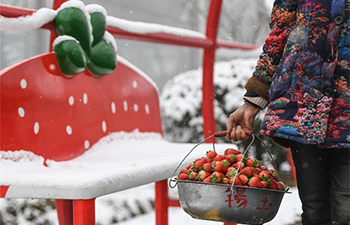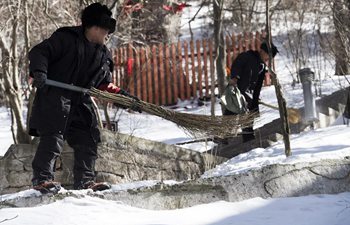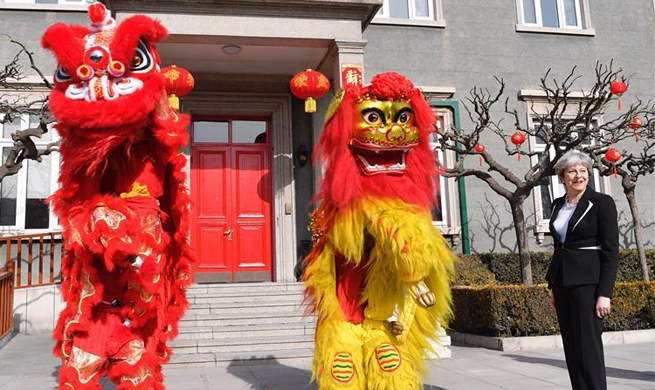URUMQI, Feb. 1 (Xinhua) -- Two years ago, Zhongxi, a youth of ethnic Tuvan group, made a big decision to form a band playing traditional Tuvan music. As time goes on, his four-piece group has become a hit in his hometown.
Zhongxi comes from Hemu County, a predominantly ethnic Tuvan area of Altay Prefecture in northwest China's Xinjiang Uygur Autonomous Region. Ethnic Tuvans are known for being brave and excelling in dancing and singing. Historically, they were cattle-herding nomads and they have later settled down and lived in the Altay Mountains for centuries.
Zhongxi named his band Mandelash, a type of straw common in Altay. Mandelash straw is often used to make chuur, a traditional flute played by Tuvan, Mongolian and other ethnic groups.
"The sound of the chuur reminds me of my father," Zhongxi said. His father taught him how to play chuur before he passed away. As their elders are leaving them, few young people know how to play traditional instruments. Zhongxi founded his band to help preserve the traditional music.
Chuur are easy to make, but difficult to master, Zhongxi said. He and his friends frequently gather to practice chuur and other Tuvan instruments. Zhongxi plays chuur and some stringed instruments. Menkdalai is the drummer in the band. Youthful Batuljei, 19, the tenor, plays the horsehead fiddle, a traditional Mongolian instrument. Semjil, the band's youngest member, plays accompanying instruments.
Each one of them has his own style. When they are on stage, Batuljei appears the most passionate. Menkdalai's drum is decorated with dragon and tiger patterns, in opposition to his quiet disposition. Semjil never makes eye contact with the audience, while the Zhongxi, the leader, always takes control of the stage.
"We are like brothers, but when it comes to music, we all have our opinions," Zhongxi said with a smile. "Small quarrels only make us closer to each other."
During the summer, the young men ride horses on the prairie. The chirps of birds and insects gave them endless inspiration. Zhongxi adores the sounds of nature, he records everything he hears in mountains, and puts it into his songs.
Zhongxi's musical career has taken off recently as the local government has made increased efforts to promote tourism and ethnic cultures. Tourists are swarming into the Altay Mountains, and the intimidating cold of winter isn't holding them back. Thanks to the government support, Zhongxi has received more requests from local businesses for commercial performances.
Traditional Tuvan music is now being heard by an increasing number of people around China.
"I hope one day we can go beyond the Altay Mountains and get on a bigger stage," Zhongxi said. "But as long as there is a stage for us, big or small, we are very grateful."
















